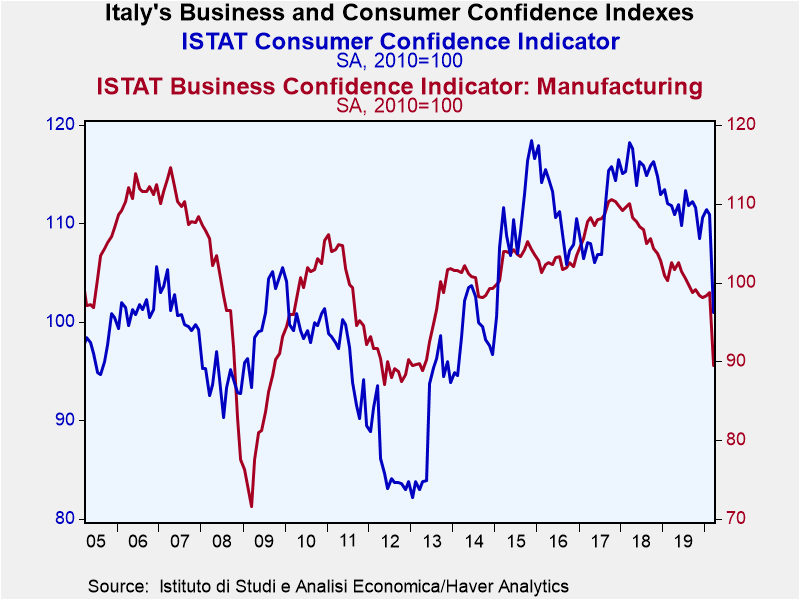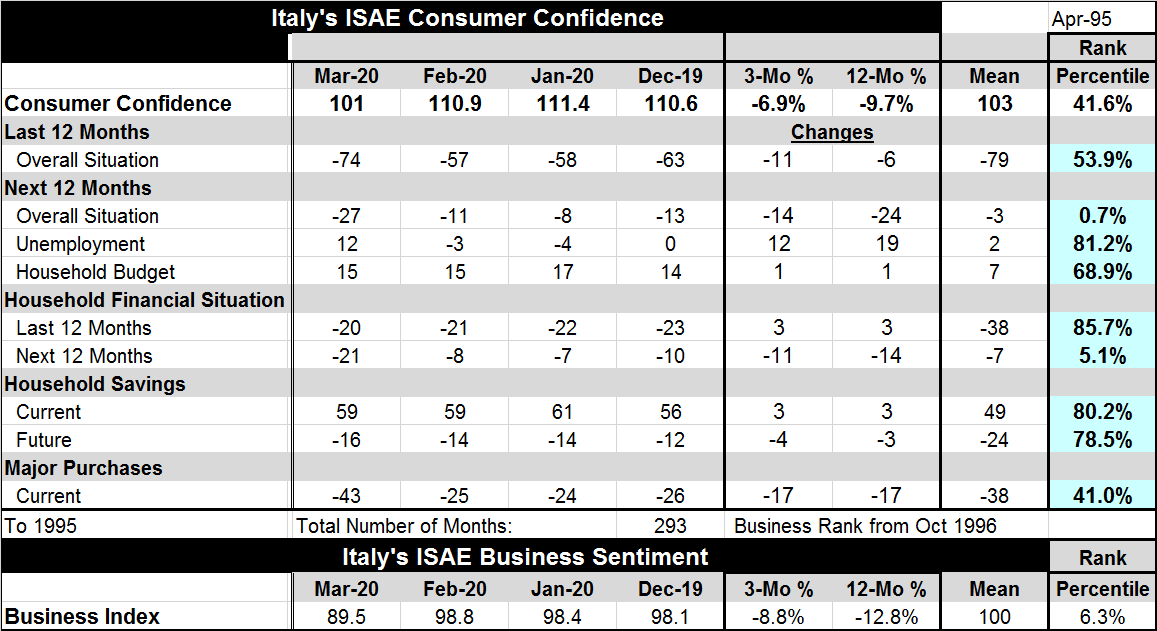 Global| Mar 27 2020
Global| Mar 27 2020Italy Is Whacked by Corona-world
Summary
A number of countries are reeling under the sting of the coronavirus and infection of COVID-19 the disease it spawns. But no country is battling harder than Italy whose economy is now starting to show some severe strains. The EU [...]
 A number of countries are reeling under the sting of the coronavirus and infection of COVID-19 the disease it spawns. But no country is battling harder than Italy whose economy is now starting to show some severe strains. The EU itself is beset with strain as its member countries are struggling with infections. Paris is reporting that its hospitals are nearly overrun. The EU has been unable to send assistance to Italy. But Russia has. Russia has sent decontamination units, military doctors and equipment by military plane. Europeans see Russia's help as a big public relations effort, especially in the wake of its grab of Crimea. But help is help (Source here).
A number of countries are reeling under the sting of the coronavirus and infection of COVID-19 the disease it spawns. But no country is battling harder than Italy whose economy is now starting to show some severe strains. The EU itself is beset with strain as its member countries are struggling with infections. Paris is reporting that its hospitals are nearly overrun. The EU has been unable to send assistance to Italy. But Russia has. Russia has sent decontamination units, military doctors and equipment by military plane. Europeans see Russia's help as a big public relations effort, especially in the wake of its grab of Crimea. But help is help (Source here).
Italy and others
Italy's economy shows a sharp drop in both consumer and business confidence in the measures released today. Meanwhile, confidence numbers from France for March showed only a small drop (to 103 from 104). But Italy is showing the kind of lopsided loss that tells us that the corona factor is in full swing there. Consumer confidence has fallen in Italy to 101 in March from 110.9 in February. Business confidence has fallen to 89.5 from 98.8. In this case, it is business confidence that has been the most soundly walloped as it sits at a queue standing among past observations in only its 6.3 percentile. Consumer confidence has a stronger reading but is still below its median with a 41.6 percentile standing.
These are weak readings for Italy and they begin to convey the change in circumstances that have come on-stream in just over one month. It appears that the February-March-April period is going to be a crucial one for countries reporting the impact of the virus on their domestic data releases. South Korea today reported a large drop in March for its consumer confidence index, a drop of over 18 points bringing the index to 78.4. New Zealand reported a March consumer confidence drop to 106.3 from 122.1. These sorts of declines are going to become much more common place. France seems to have dodged a bullet in March, but it should be significantly affected in April.
Italy's situation
The economic assessments by consumers are all about changing times. Consumers assess the overall situation as not too bad at the moment with 53.9 percentile standing. Of course, that reading is in place after the survey index fell to -74 in March from -57 in February. While the current ‘standing is still above is median, the monthly change is on the scale of horrific.
The degradation becomes clearer perusing the assessments for the next 12 months. There, the overall situation assessment has shed 16 points compared to February dropping to -27 from -11 and logging a queue percentile standing that is chillingly weak at 0.7% -- weaker than the current reading less than 1% of the time. The expectation for unemployment has risen to a net reading of +12 from -3 and that represents an 81.2 percentile standing-- a relatively high standing for a feared economic condition. However, households do not see any budget impact as there is no change in their assessment of their own budgets between what is expected in 12 months currently, compared to what had been expected last month.
However, the household financial situation is another matter. The ranking for this metric over the last 12 months has an 85.7 percentile standing; it compares to a 5.1 percentile standing looking ahead to the next 12 months. Households are very worried about their financial situation. The assessment of the past 12 months has hardly changed, but the assessment of the 12 months ahead fell from a -8 reading in February to -21 in March, generating that weak percentile standing. Households do not see much impact on current savings or on future household savings as neither gauge has shifted much from its respective month ago reading. Both readings now have percentile standings at or near their respective 80th percentiles.
There is a clear negative impact on spending where the major current purchase index has fallen to -43 in March from -25 in February to a 41.0 percentile standing.
Italy is feeling the pain full bore from the corona shutdown of its economy. Officials say that the peak impact has not yet arrived although some officials see indications that the peaking may not be far away. Italy continues to have concerns that the virus will spread south.

When the virus goes viral
The global impact of the virus is growing. It is encroaching on virtually all countries. The speed of the spread is different across countries, but the breadth of the impact appears to be considerable everywhere. Maybe this virus crisis will help to cement the view that we are all on this planet together and lead to stronger common efforts on some of the climate control issues that have so far gotten little more than lip service in support. The spread of the virus shows how bad such a global event can be when it springs forth catching everyone unware. There also may be lessons here about the things that go on within a nation that nonetheless can spawn a global crisis. Are there steps that can be taken to prevent that in the future or not? Air and water pollution are examples of conditions that occur within a county's border but nonetheless affect the world. Is what goes on within national boundaries truly a country's domestic concern only or are there times when neighboring countries have rights to know what is going on across the border? If so, how would that work? It was China's bungling of a domestic heath episode that tripped the wire on the entire global epidemic. The Great Barrier Reef of Australia has just undergone another severe bleaching from warmed waters. Brazil has stopped its policing of Amazon land-clearing while it deals with the virus. Climate affecting events affect us all.
Robert Brusca
AuthorMore in Author Profile »Robert A. Brusca is Chief Economist of Fact and Opinion Economics, a consulting firm he founded in Manhattan. He has been an economist on Wall Street for over 25 years. He has visited central banking and large institutional clients in over 30 countries in his career as an economist. Mr. Brusca was a Divisional Research Chief at the Federal Reserve Bank of NY (Chief of the International Financial markets Division), a Fed Watcher at Irving Trust and Chief Economist at Nikko Securities International. He is widely quoted and appears in various media. Mr. Brusca holds an MA and Ph.D. in economics from Michigan State University and a BA in Economics from the University of Michigan. His research pursues his strong interests in non aligned policy economics as well as international economics. FAO Economics’ research targets investors to assist them in making better investment decisions in stocks, bonds and in a variety of international assets. The company does not manage money and has no conflicts in giving economic advice.
More Economy in Brief
 Global| Feb 05 2026
Global| Feb 05 2026Charts of the Week: Balanced Policy, Resilient Data and AI Narratives
by:Andrew Cates






